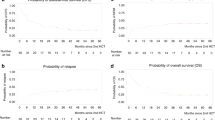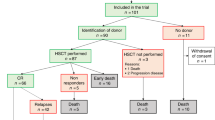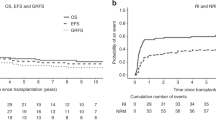Abstract
The prognosis for patients with secondary AML, primary resistant AML or ALL and early (<12 months) relapse of acute leukaemia remains extremely poor with conventional chemotherapy. as part of a strategy to improve the outcome for these patients we have treated 22 consecutive patients (18 aml, four all, median age 35 years) with either primary resistant disease (n = 3), early relapsed leukaemia (n = 12) or secondary AML (n = 7, four RAEBt, two antecedant ALL and one antecedant Hodgkin’s disease) with ‘FLAG’ induction chemotherapy with the aim of proceeding to early allogeneic transplantation either from sibling or unrelated donors. Eighteen patients achieved CR after one course of FLAG, including five patients who had documented p-glycoprotein-induced multidrug resistance and 10 patients with adverse cytogenetic abnormalities. Eight patients were consolidated with a second course of FLAG prior to transplantation and so far 16 patients have undergone allogeneic transplantation, 10 from unrelated donors and six from sibling donors (one mismatched). By the time of transplant three patients had progressed and were in early relapse and all have relapsed post BMT. Of the remaining 13 patients transplanted in remission, nine remain in CCR at a range of 4–26 months, three have died of transplant-related complications (18%) and one patient has relapsed. We conclude that the use of FLAG induction therapy followed by early allogeneic transplantation from either a sibling or unrelated donor can be an effective strategy for the treatment of this difficult group of young patients with poor risk acute leukaemia and appears to be associated with a low procedure-related risk.
This is a preview of subscription content, access via your institution
Access options
Subscribe to this journal
Receive 12 print issues and online access
$259.00 per year
only $21.58 per issue
Buy this article
- Purchase on Springer Link
- Instant access to full article PDF
Prices may be subject to local taxes which are calculated during checkout
Similar content being viewed by others
Author information
Authors and Affiliations
Rights and permissions
About this article
Cite this article
Byrne, J., Dasgupta, E., Pallis, M. et al. Early allogeneic transplantation for refractory or relapsed acute leukaemia following remission induction with FLAG. Leukemia 13, 786–791 (1999). https://doi.org/10.1038/sj.leu.2401406
Received:
Accepted:
Published:
Issue Date:
DOI: https://doi.org/10.1038/sj.leu.2401406
Keywords
This article is cited by
-
Phase II study of FLAGM (fludarabine + high-dose cytarabine + granulocyte colony-stimulating factor + mitoxantrone) for relapsed or refractory acute myeloid leukemia
International Journal of Hematology (2019)
-
Analysis of the interaction of induction regimens with p-glycoprotein expression in patients with acute myeloid leukaemia: results from the MRC AML15 trial
Blood Cancer Journal (2011)
-
Sequential continuous infusion of fludarabine and cytarabine associated with liposomal daunorubicin (DaunoXome®) (FLAD) in primary refractory or relapsed adult acute myeloid leukemia patients
Annals of Hematology (2009)
-
Targeting multidrug resistance in cancer
Nature Reviews Drug Discovery (2006)
-
Strategies for overcoming p-glycoprotein-mediated drug resistance in acute myeloblastic leukaemia
Leukemia (2004)



